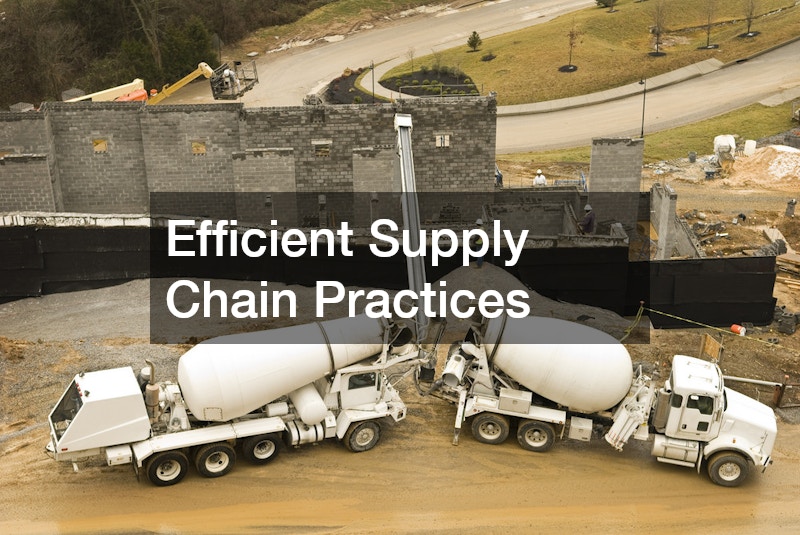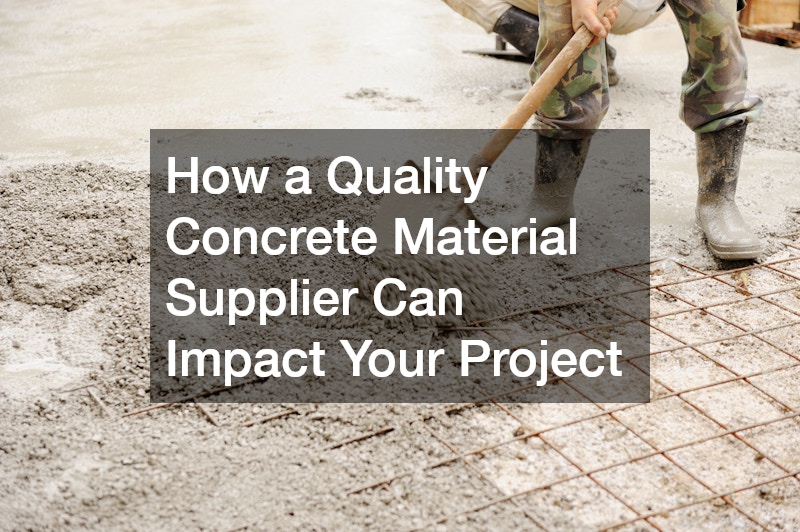The importance of selecting a reliable concrete material supplier cannot be overstated. A quality supplier provides materials that ensure durability, safety, and sustainability, which are all crucial to any project’s success. This article explores the multifaceted impacts of opting for a high-caliber concrete supplier, demonstrating how these choices reverberate throughout your project’s timeline, budget, and environmental footprint.
Why Choosing the Right Concrete Supplier Is Necessary
Ensuring Project Durability and Safety
A trustworthy concrete supplier offers high-grade materials that are pivotal to the structural integrity of a construction project. Utilizing substandard materials can result in structural failures, posing risks to safety and necessitating costly repairs. By choosing a supplier with rigorous quality standards, you minimize these potential risks and ensure compliance with safety regulations.
In addition to safety, long-term durability is critical for the project’s lifespan, influencing maintenance costs and overall value. Reliable suppliers adhere to strict manufacturing processes, resulting in consistent quality that withstands environmental stresses. This contributes not only to the project’s longevity but also enhances its resale value and reputation.
Quality materials from reputable suppliers often come with certifications and detailed material specifications. These documents provide assurance that the products meet or exceed industry standards, bolstering confidence in the final structure. Therefore, selecting the right concrete supplier is an investment in the project’s overall durability and safety.
Maintaining Project Timeline and Budget
Timeliness is a critical factor in construction projects, and delays can multiply costs quickly. Working with an efficient concrete supplier can significantly mitigate this risk by ensuring on-time delivery of materials. It is essential to partner with a supplier that has a robust logistics system and a strong track record in meeting delivery schedules.
Moreover, budget management becomes more predictable when working with a reliable supplier. Consistent quality and timely delivery minimize the need for unexpected expenditures on replacements and repairs, thereby sticking to original financial projections. Selecting a supplier that understands your project’s requirements can remove potential financial strain from timeline disruptions.
Choosing a low-quality supplier often results in unpredictable expenses arising from material inconsistencies and delays, both of which can hinder project progress. This highlights the importance of evaluating suppliers based on their capacity to deliver within scheduled timelines and budget constraints. Therefore, coupling timeline efficiency with budget oversight ensures smoother project execution.
What You Should Look For in a Quality Concrete Supplier
Reputation and Experience
An established reputation and years of industry experience are key indicators of a quality concrete supplier. A strong track record implies a history of successful projects and satisfied clients, reflecting reliability and professionalism. Reviewing testimonials and industry accolades can provide valuable insights into a supplier’s performance history.
Experienced suppliers bring valuable insights and recommendations, which can be particularly beneficial for complex projects. Their deep understanding of material characteristics and project requirements can help mitigate potential challenges before they arise. The guidance of a well-seasoned supplier can be particularly advantageous in large-scale projects where expertise is crucial.
The accreditation and certifications held by a supplier reflect their commitment to industry standards and best practices. Such recognition adds credibility and often ensures the supplier adheres to the latest technological and environmental advancements. Ultimately, experience underpins a supplier’s capability to deliver quality solutions that align with your project’s needs.
Consistency and Quality Control
Consistency in product quality is a cornerstone of a dependable concrete supplier. A supplier with stringent quality control processes ensures that the materials supplied meet specific standards on every order. This reduces the risk of variance in material properties, which could otherwise lead to structural weaknesses.
Quality control measures often include regular testing and evaluation of raw materials used in concrete production. Suppliers adhering to rigorous protocols can identify and address issues promptly, maintaining the integrity of their products. This dedication to quality can vastly enhance the reliability and performance of the overall construction.
The establishment of comprehensive quality assurance services within the supply chain reflects a supplier’s focus on excellence. These processes are crucial to producing concrete that not only meets standard specifications but also promises longevity and resilience. In essence, consistency and quality control frameworks are vital components that sustain construction quality over time.
How a Supplier Affects the Environmental Aspect of Your Project
Sustainable Material Options
In today’s environmentally conscious world, the choice of materials plays a significant role in sustainable building practices. Suppliers offering eco-friendly concrete alternatives reduce the project’s environmental footprint by minimizing resource consumption and emissions. Opting for materials with recycled content or low-carbon profiles can greatly benefit sustainability goals.
Innovative suppliers lead the way by developing sustainable concrete solutions, such as those incorporating alternative aggregates or clinker replacements. Such innovations do not compromise the material’s performance, ensuring projects maintain high standards of durability and aesthetics. When suppliers prioritize sustainability, they foster progress toward eco-friendly building practices industry-wide.
Efficient Supply Chain Practices
Beyond materials, efficient supply chain practices also play a pivotal role in environmental impact reduction. Suppliers who prioritize waste reduction, energy efficiency, and responsible sourcing lead to more sustainable projects. Their strategic logistics planning minimizes transport emissions and resource wastage, contributing to overall environmental stewardship.
Modern suppliers are increasingly investing in technologies and practices that optimize their supply chains, from production through to delivery. This includes adopting renewable energy in manufacturing processes or utilizing digital systems for better supply chain transparency and accountability. These advancements not only reduce the environmental impact but also enhance operational efficiency.
Choosing a quality concrete material supplier can profoundly impact the success of your construction project. From ensuring structural integrity and safety to maintaining timelines and budgets, the choice of supplier plays a pivotal role. Furthermore, focusing on environmental aspects through sustainable practices and efficient supply chains enhances the project’s overall value and alignment with modern building standards.




